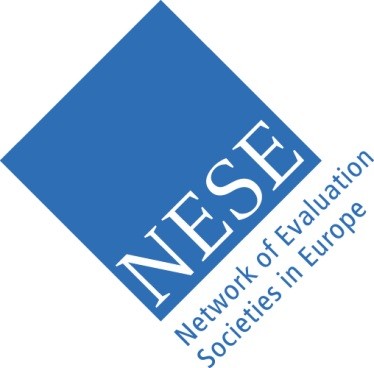NESE - Network of Evaluation Societies in Europe
NESE is an open, non-profit umbrella organization that supports national evaluation societies (ES) and networks in Europe to become recognized and trusted organizations in their respective countries able to promote and advise for quality and better use of evaluation.
NESE aims at strengthening the capacity of associated evaluation societies to develop sound and independent practice. It provides an arena where evaluation societies can learn and support each other to promote good evaluation practice in their countries. NESE also facilitates the foundation and growth of new evaluation societies.
The works are moderated jointly by an EES Board member and a national evaluation society on a bi/annually rolling basis: French Evaluation Society (2009), DeGEval (2010), Italian Evaluation Society (2011), UK Evaluation Society (2012). At the NESE meeting on 2nd October 2014, in Dublin, Ireland it was agreed that the NESE group will be jointly coordinated for the next period by the Czech Evaluation Society and Slovak Evaluation Society. Since the NESE meeting in October 2016, the new NESE coordinator is the Polish Evaluation Society. During the EES Conference in Thessaloniki in October 2018 and the NESE meeting, it was agreed that for the period of 2018 -2020 the NESE work will be coordinated by the Macedonian Evaluation Network.
Vision
NESE is a European learning network that supports the national evaluation societies to co-operate towards developing mutual knowledge, to exchange good practices, and to promote the evaluation culture and profession in the European countries. NESE creates value through the establishment of a common ground, throughout the EU, for those ES interested in exchanging evaluation-related practices and knowledge.
Mission
- Create instruments to support national ESs and contribute to the improvement of evaluation and its development in European countries
- Recognize the current level of evaluation development in Europe,
- Identify and understand reasons for disparities
- Strengthen the evaluation profession and the practitioners associated to ESs;
- Nurture diversity and inclusiveness in the European evaluation community;
- Support cooperation between ESs in Europe.
Goals and activities
Facilitation of national evaluation societies’ institutional capacity building and the harmonization of national evaluation practices and tools
- Coordination of regional networks across Europe
- Facilitate the transfer of know-how from advanced countries to countries with less developed evaluation, providing a platform for mentoring process
- Development of a guidance document shared with all ESs to build their institutional capacity
- Support ESs in the development of NEP (National Evaluation Policy), NES (National Evaluation System) and building suitable regulation for better use of evaluation
- Organise affordable regional trainings in evaluation (for users, managers and evaluation experts, practitioners)
- Organisation of regular events as conferences, experience exchange events aimed at representatives of national evaluation societies
Coordination of the national societies towards the better understanding of the evaluation market
- Recognize the current level of evaluation development in Europe by Baseline mapping of state of play in all European countries
- Inform national ESs about news in regional and global initiatives and achievements in the field of evaluation
- Monitor and follow-up of evaluation development progress in Europe
- Support of ESs to advocate for better regulation and introduction of evaluation in all public institutions as a tool for the implementation of evidence based decision making concept
Collaboration with other key stakeholders
- EES, EvalPartners/IOCE, Peer–to–Peer (P2P) FP1, FP2…
- Act as a platform for cooperation with other international and global stakeholders
- Support ESs for participation in preparation of the VNRs (Voluntary National Reviews)
Facilitation of the improvement of an evaluation culture
- Support national societies and networks to organise events with stakeholders that will contribute to evaluation development
- Disseminate information related to professionalization, ethics, quality, etc
- Support ESs in promotion of evaluation benefits
The promotion of evaluation as a profession and the visibility upgrade of the profession
- Build a database of all national societies and all members in national societies to promote networking and professionals’ collaboration
- Implement projects for evaluation development
- Implement the international professional standards and certification
Members
NESE members are non-profit organizations devoted to the public interest. Membership is open to formally and informally constituted evaluation societies that are free of state and commercial influence. Members cooperate on a voluntary basis to achieve commonly defined goals.
Members of NESE promote the NESE mission in their national societies. NESE supports activities of its members in their national framework being implemented in the context of the NESE mission.
In order to promote transparency, quality development and knowledge exchange, NESE organizes annual meetings, encourages collaborative work and facilitates the systematic exchange of information among its members.
Organization and Structure
NESE is established within EES and its work is complementary with the work of EES. While EES is mostly working for benefits of individual evaluators, NESE works on supporting institutional capacities in European societies that work on the promotion of evaluation use and building evaluation culture.
NESE is coordinated by its Advisory Board. EES is represented in the AB by its representative.

